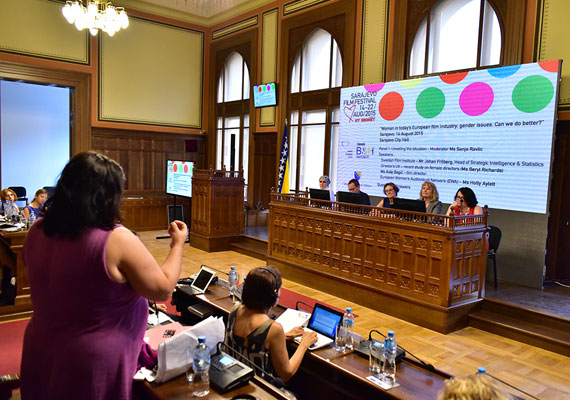Gender equality declaration adopted in Sarajevo
- A declaration that calls for policies to counter the gender imbalance in the European film industry was adopted in Sarajevo on 14 August

At the high-level conference “Women in Today’s Film Industry: Gender Issues. Can We Do Better?”, held at the Sarajevo Film Festival on 14 August, a declaration was adopted that calls for policies to counter the gender imbalance in the European audiovisual industry.
The conference was organised by the Ministries of Civil Affairs and Foreign Affairs and the Sarajevo Film Festival in the framework of Bosnia and Herzegovina's chairmanship of the Council of Europe's Committee of Ministers, and was attended by representatives from Ministries of Culture and film funds from across Europe.
Adil Osmanović, Minister of Civil Affairs of Bosnia and Herzegovina, opened the conference. Throughout the day, a number of expert speakers from organisations including national film funds and the European Women's Audiovisual Network (EWA) shared case studies and examples of best practice from their respective countries.
A declaration that emphasises that "a true democracy must make full use of the skills, talents and creativity of women and men alike" was adopted at the end of the conference. It also calls on the Council of Europe to encourage its member states to implement policies to reduce the gender imbalance in the European audiovisual industry.
Furthermore, it proposes that a number of activities be carried out through the Eurimages fund, including those intended to:
- encourage member states to produce gender-based statistics and analyse the causes of the marginalisation of women;
- encourage member states to adopt equality policies aimed at improving access to public funding for women;
- develop measures for improving gender balance in decision-making posts in the industry;
- enhance the visibility of female filmmakers;
- raise awareness through conferences, publishing studies collecting and disseminating examples of best practice; and
- encourage filmmakers to be more sensitive to on-screen female representation.
The full text of the declaration can be read here.
"The declaration is not binding; it is a sort of soft law, but it will offer us a solid basis in many countries and a formulation of strategies in the audiovisual/cinema sector," Sanja Ravlic, head of the Eurimages Gender Equality Study Group, told Cineuropa.
The fact that a declaration like this is necessary is confirmed both by the statistics and by the industry's perception of the issue.
"When we ask women directors or producers if gender inequality is an issue in their countries, they usually say there is no problem," Isabel Castro, deputy executive director of Eurimages, told Cineuropa. "Only when they look at the numbers do they realise it really is a problem."
And the numbers are far from encouraging: in the period 2000-2012, the average proportion of films directed by women in Europe was 16.3%. This figure relates to feature-length films supported by Eurimages.
Although production has increased significantly in the past five years on the European level, the percentage of films directed by women remains low.
“Analysis shows that the proportion of women in film schools is even, so they start in the profession but don’t become directors," says Castro. "They are made to think it is too ambitious and aren’t encouraged to become directors.
“There is also a drop when it comes to women making a second film. Things will improve when women are allowed to fail as much as men.”
Did you enjoy reading this article? Please subscribe to our newsletter to receive more stories like this directly in your inbox.
















